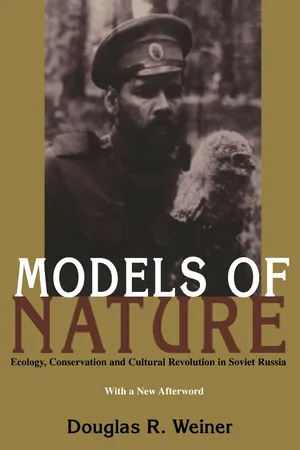
eBook - PDF
Models Of Nature
Ecology, Conservation, and Cultural Revolution in Soviet Russia
- English
- PDF
- Available on iOS & Android
eBook - PDF
About this book
With a new afterword by the authorA study of the early and turbulent years of the Soviet conservation movement. Focusing on the period from the October Revolution to the mid-1930s (from Lenin's rule to the rise of Stalin), Douglas R. Weiner studies the divergence between the growing ecological movement in the country and the state's social and economic policies. The book offers a view of both sides of this dispute: scientific conservation movements on the one hand and an industrializing nation's attitude toward science, scientists, nature, and massive development on the other. Weiner explains the development of pioneering conservation institutions, state practices, and ecological theory in the Soviet Union during the 1920s , and why those developments were sidelined or quashed by Stalin. The book provides a telling example of the social construction of science, showing how the perceived political implications of rival ecological theories influenced Soviet scientists, and chronicles the nature protection movement's conflicts with both the vigilantes of the Cultural Revolution and Stalin's first Five-Year Plan, which blatantly ignored potential environmental consequences in its quest to industrialize on a large scale.The new afterword reflects upon the study's impact and discusses advances in the field since the book was first published. Now in paperback, this classic text is well suited for course use in Russian history, environmental studies, and history of science.
Frequently asked questions
Yes, you can cancel anytime from the Subscription tab in your account settings on the Perlego website. Your subscription will stay active until the end of your current billing period. Learn how to cancel your subscription.
No, books cannot be downloaded as external files, such as PDFs, for use outside of Perlego. However, you can download books within the Perlego app for offline reading on mobile or tablet. Learn more here.
Perlego offers two plans: Essential and Complete
- Essential is ideal for learners and professionals who enjoy exploring a wide range of subjects. Access the Essential Library with 800,000+ trusted titles and best-sellers across business, personal growth, and the humanities. Includes unlimited reading time and Standard Read Aloud voice.
- Complete: Perfect for advanced learners and researchers needing full, unrestricted access. Unlock 1.4M+ books across hundreds of subjects, including academic and specialized titles. The Complete Plan also includes advanced features like Premium Read Aloud and Research Assistant.
We are an online textbook subscription service, where you can get access to an entire online library for less than the price of a single book per month. With over 1 million books across 1000+ topics, we’ve got you covered! Learn more here.
Look out for the read-aloud symbol on your next book to see if you can listen to it. The read-aloud tool reads text aloud for you, highlighting the text as it is being read. You can pause it, speed it up and slow it down. Learn more here.
Yes! You can use the Perlego app on both iOS or Android devices to read anytime, anywhere — even offline. Perfect for commutes or when you’re on the go.
Please note we cannot support devices running on iOS 13 and Android 7 or earlier. Learn more about using the app.
Please note we cannot support devices running on iOS 13 and Android 7 or earlier. Learn more about using the app.
Yes, you can access Models Of Nature by Douglas R. Weiner in PDF and/or ePUB format, as well as other popular books in History & Russian History. We have over one million books available in our catalogue for you to explore.
Information
Table of contents
- Contents
- Preface
- Acknowledgments
- Introduction
- Chapter 1. Monuments of Nature
- Chapter 2. Conservation and Revolution
- Chapter 3. Conservation under the NEP
- Chapter 4. The Limits to Growth
- Chapter 5. The Goskomitet and the Zapovedniki
- Chapter 6. Models of Nature: The Zapovedniki and Community Ecology
- Chapter 7. The Conservation Congress of 1929
- Chapter 8. The Cultural Revolution Comes to Biology
- Chapter 9. Protective Coloration
- Chapter 10. Conservation and the Five-Year Plan
- Chapter 11. The Great Transformation of Nature
- Chapter 12. Engineers of Nature
- Chapter 13. The First All-Union Conservation Congress
- Chapter 14. Conservation without Ecology: Nature Protection in the Age of Lysenko
- Conclusion
- Afterword
- Appendix 1. Soviet Zapovedniki: Affiliation, Area, and Administrative Status, 1925–1933
- Appendix 2. Zapovedniki of the USSR in 1933
- Acronyms
- Glossary
- Abbreviations Used in Notes and Bibliography
- Notes
- Selected Bibliography
- Index
- Map of Soviet Zapovedniki circa 1933
- Photographs and Illustrations